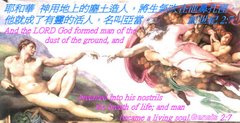| 16:9 | 耶和華的使者對她說:“你回到你主母那裡,服在她手下。” |
| 16:10 | 又說:“我必使你的後裔極其繁多,甚至不可勝數。” |
| 16:11 | 並說:“你如今懷孕要生一個兒子,可以給他起名叫以實瑪利(註:就是“ 神聽見”的意思),因為耶和華聽見了你的苦情。 |
| 16:12 | 他為人必像野驢。他的手要攻打人,人的手也要攻打他。他必住在眾弟兄的東邊。” |
| 16:13 | 夏甲就稱那對她說話的耶和華為“看顧人的 神”。因而說:“在這裡我也看見那看顧我的嗎?” |
| 16:14 | 所以這井名叫庇耳拉海萊。這井正在加低斯和巴列中間。 |
| 16:15 | 後來夏甲給亞伯蘭生了一個兒子,亞伯蘭給他起名叫以實瑪利。 |
| 16:16 | 夏甲給亞伯蘭生以實瑪利的時候,亞伯蘭年八十六歲。 |
神可以修正錯誤,把缺乏變為祝福。你可曾經歷祂這樣的幫助?
16:13 撒萊、亞伯蘭和夏甲都犯了嚴重的錯誤:(1)撒萊用自己的方法來處理事情,將使女給亞伯蘭作妾。(2)亞伯蘭依從撒萊的計劃,但當情勢不妙的時候,卻不肯幫助解決困難。(3)夏甲則逃避困難。雖然事情被弄得一團糟,神卻顯示祂能使萬事變得有益處(參羅8:28)。撒萊和亞伯蘭得到了他們極其渴望得到的兒子,夏甲的問題也得到解決。只要我們願意讓神幫助我們,就沒有難以解決的問題。
-------------------------------------------------------------------------------------------------
Genesis
| 16:9 | And the angel of the LORD said unto her, Return to thy mistress, and submit thyself under her hands. | |
| 16:10 | And the angel of the LORD said unto her, I will multiply thy seed exceedingly, that it shall not be numbered for multitude. | |
| 16:11 | And the angel of the LORD said unto her, Behold, thou art with child, and shalt bear a son, and shalt call his name Ishmael; because the LORD hath heard thy affliction. | |
| 16:12 | And he will be a wild man; his hand will be against every man, and every man's hand against him; and he shall dwell in the presence of all his brethren. | |
| 16:13 | And she called the name of the LORD that spake unto her, Thou God seest me: for she said, Have I also here looked after him that seeth me? | |
| 16:14 | Wherefore the well was called Beerlahairoi; behold, it is between Kadesh and Bered. | |
| 16:15 | And Hagar bare Abram a son: and Abram called his son's name, which Hagar bare, Ishmael. | |
| 16:16 | And Abram was fourscore and six years old, when Hagar bare Ishmael to Abram. |
16:13 Salai, Ebailan and Jiajia have committed a serious mistake: (1) Salai with their own ways of dealing with things, would allow women to Ebailanzuoqie. (2) compliance Salai Ebailan plan, but when the situation when things were not going well, but is unwilling to help resolve difficulties. (3) Jiajia is run away from difficulties. Although the incident was make a mess, but God showed everything he can become a good (Senate-8:28). Salai and Ebailan have been extremely eager to get their son, Jiajia problem has been resolved. As long as we are willing to let God help us, there will be no difficult issues.
|
閱覽更多新聞,請看世界日報。
PRC reportedly researchers pointed out that the United States, often nap during the day for the elderly, stroke rate four times higher than the average number of people. The researchers also found that these elderly people suffering from heart disease and other cardiovascular disease risk is also higher.
Columbia University in New York package Deaierbala said: "Even in our control hypertension, diabetes, physical activity, obesity and socio-economic factors such as project status and found that daytime sleepiness situation for the elderly, stroke higher probability than most people many. "
Her research 2,153 average 73-year-old found, "occasionally snooze" Group of stroke risk than the "never snooze" were 2.6 times more. And "often snooze" Group stroke risk is 1.5 times more.
The study in the New Orleans of the American Stroke Association for a meeting in 1998. This is the first wave of concern snooze and the "vascular" linkages between one of the studies. They studied vascular problems such as stroke.
This wave of other studies have pointed out that patients with sleep apnea, which is nighttime sleep breathing will be temporarily suspended, a very high probability of stroke. Such diseases can also cause daytime sleepiness problems.
Packet Deaierbala object of study, most of the same community in New York City, more than 40-year-old Latino male and female residents. These people have never had a stroke.
Researchers studied assess their requirements in specific circumstances snooze frequency, such as when watching television, no liquor sitting quietly after lunch time, as well as driving in a state of suspended pending. About 44 percent of the people never return snooze, 47 percent said they occasionally snooze, 9 percent of the people said that often snooze.
Researchers View in the two and a half years after the number of people suffering from stroke or other vascular diseases, such as heart disease. They found that 40 stroke, 127 people suffer from vascular disease.
They found that, it is difficult not snooze highest probability of stroke, but most alarming is that moderate snooze frequency of the group.
Packet Deaierbala said in the telephone interview: "We have found, the group of 2.5-fold increased risk of stroke, suffering from various vascular diseases also increased 60% probability."
She said that the reasons for daytime sleepiness is still unclear whether the lethargy of the sleep apnea, is also unknown.
2008-03-05
Read more news, see the World Journal.













No comments:
Post a Comment